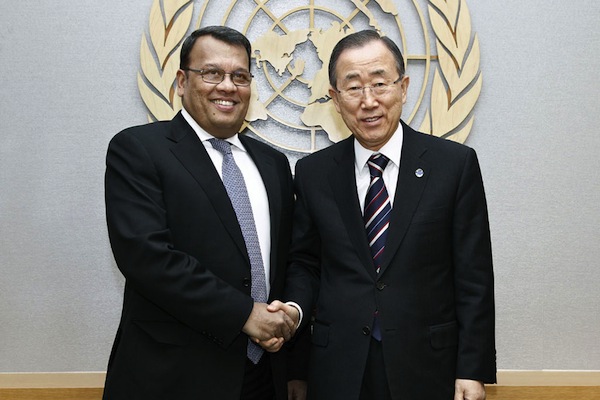 Many Shades of Accountability: The UN and Sri Lanka
Many Shades of Accountability: The UN and Sri Lanka

Photo courtesy United Nations
In the last stages of the war in Sri Lanka tens of thousands of civilians were killed and no one has been held to account to date. This article though is not about the accountability of the Government of Sri Lanka(GoSL) for the killings. Hundreds, if not thousands, have already discussed, written and produced documentaries demanding GoSL for action on this count. The UN Secretary General’s Panel of Experts (PoE) put GoSL on the dock and recommended independent and credible investigations.
Though little has changed in Government’s position on the issue, ‘accountability’ has continued to remain a thorn and has forced the Rajapakses to steer away from the ludicrous defense of ‘zero casualty’, ‘gun in one hand and human rights charter in the next’ and other such denial theatrics. It has compelled the Government to appoint ‘Lessons Learnt Commission’ (LLRC) and Military inquiry panels to buy time and to hope that things will fade away. But war-crimes and crimes against humanity are serious business and they appear unlikely to go away from the agenda of the international community for some time to come. Most importantly they will remain an issue in the country since those who were killed and those who killed are both Sri Lankans and the memories and evidence are hard to extinguish.
But there is another entity, whose acts and omissions let these tens of thousands of civilians to be killed and hundreds of thousands be interned, which probably might go scot free. To recap, since the time of the war the conduct of UN in Sri Lanka has been under criticism for failing to live up to its protection mandate and to ensure upholding of humanitarian principles, of which it is the custodian. For many of the affected people, UN became an irrelevant actor at best and complicit one at worst during a crucial time when they were most vulnerable – be it in the war zone when they were held as human shields by LTTE or when they were fired and strafed upon by the Sri Lankan army, navy and air force or subsequently when they were processed through various check points and incarcerated in Menik Farm ‘welfare’ centers.
